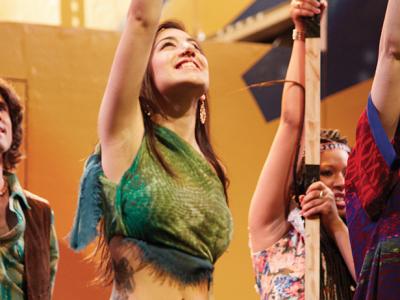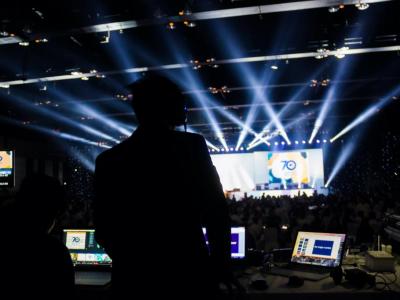What does a Lighting Technician (Live Events and Performances) do?
Everything needs lighting, from performances such as concerts, dance shows, plays, musicals, and comedy sets to live events like fundraisers, galas, awards shows, rallies, and gallery openings. Working in a number of distinct roles within the lighting crew, lighting technicians bring life to the plans and blueprints of lighting designers. This almost certainly means rigging and programming tried-and-true overhead lighting, but may also mean working with other visual components such as video screens, background projections, or LEDs. Lighting technicians are, by necessity, highly versatile engineers, capable of performing a wide variety of duties in service of the show.
A Day in the Life
Unless they're working in-house at a particular venue or using exclusively house equipment, lighting technicians usually start by loading in their equipment, organizing cables, hanging lights (which can require climbing as high as 50 feet), and focusing the light fixtures. Then it's time to make sure the light boards are programmed, a process that differs depending on the amount of design and preparation going into the show. When it's time for the show, lighting technicians might operate light boards, call cues, manage power distribution, and solve problems as they arise. After and in between shows, lighting technicians keep the equipment in order: checking for wear and tear, making small repairs, and ordering supplies as necessary.
No two jobs are the same, particularly because the specific duties of a lighting technician depend on his or her role in the overall lighting crew, and the size and organization of the crew depends, in turn, on the needs of the show. In general, lighting crews are broken down into several distinct roles, and may include one or more electricians, dimmer technicians, programmers, lighting directors, and crew chiefs.
At a Glance
There are no formal educational requirements for working as a lighting technician, although a degree in electrical engineering can come in handy. Most get their first training on the job; those who work in the music scene might get started as concert techs on tours, while those who work in the theater scene may begin as technical apprentices. This job serves as an introduction to every aspect of lighting, and as such is an excellent jumping-off point for aspiring lighting designers. In addition to becoming designers, experienced and successful technicians are well-positioned to produce their own shows as veterans of the live performance and events scene, or become technical directors.
Lighting technicians work in a number of different capacities. Some are freelancers, whose professional connections with crew chiefs, designers, entertainment companies, and rental events companies bring in a steady flow of work at local performance and events venues. Others work mostly for record labels on national or regional tours. Some theater companies and performance-oriented schools may hire experienced lighting technicians as in-house employees, but in general these positions are limited and more likely to go to highly educated technical directors.
- Rigging lighting equipment
- Light board operation
- Electrics
- Spotlight operation
- Video/multimedia
- Lighting design
- Physical fitness
- Attention to detail
Lighting technicians are versatile, flexible workers. They must be humble, good at taking direction, personable, and comfortable working closely with the crew for hours at a time. The social aspect of this job is important, especially in touring situations, where coworkers are the only consistent social contact for weeks. In addition to taking direction well, lighting technicians should strive to show initiative, independence, efficiency, and an ability to keep calm under pressure, as these are the kinds of technicians who crew chiefs are likely to recommend and rehire.
Lighting technicians almost always work on contract, have inconsistent work schedules, and spend a certain amount of time traveling to and from gigs. They do the vast majority of their work in the afternoon and evening, sometimes working until the early hours of the morning in the case of late gigs and load-outs. Aspiring lighting techs should be advised that intense physical labor and dizzying heights are fundamental aspects of the job. Additionally, everything that has been said about life on tour applies to lighting technicians who choose to take on touring commitments: weeks or months away from home, living in close quarters with the crew, and spending long hours on the road.







